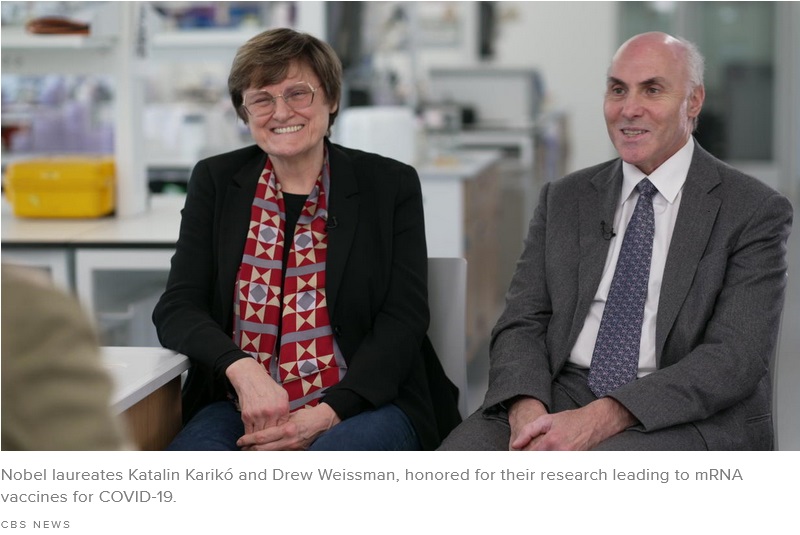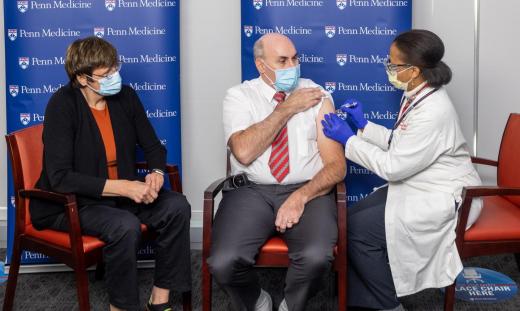
What is mRNA good for? Just over a year after October 2, 2023, when Katalin Karikó and Drew Weissman were named winners of the Nobel Prize in Physiology or Medicine, the University of Szeged will host a conference showcasing the latest breakthroughs in mRNA research. At the press conference held to announce the event, Katalin Karikó, joining online, revealed that intensive research efforts have already led to the clinical testing of various mRNA-based drugs and treatments.
October 2, 2023, was an unforgettable day for the University of Szeged, which took great pride in sharing the news that the 2023 Nobel Prize in Physiology or Medicine would be awarded to Katalin Karikó and Drew Weissman.

The moments of the ‘Nobel Prize phone call’ on October 2, 2023, and the joyful hours of celebration that followed on Katalin Karikó’s remarkable day were first covered by correspondents from the University of Szeged. Photo: István Sahin-Tóth.
Katalin Karikó and Drew Weissman were awarded the Nobel Prize “for their discoveries concerning nucleoside base modifications” in recognition of how these modifications “enabled the development of effective mRNA vaccines against COVID-19”. It is no surprise that, beyond getting to know the captivating life story of Katalin Karikó, the first Hungarian woman to receive the world’s most prestigious scientific award, both the scientific community and the general public are eager to learn more about the secrets of mRNA, the extraordinary molecule now harnessed for healing.
At the press event held to announce the mRNA Conference in Szeged, scheduled for November 7–8, 2024, journalists relayed questions from the public to Katalin Karikó. In response, the University of Szeged professor shared insights into the daily life of a Nobel laureate and explained her choice to invite a fellow student from her university days and a longtime acquaintance from her hometown of Kisújszállás to speak at the symposium. Additionally, in response to questions from reporters, she outlined the most significant achievements in mRNA-related developments – a summary of which is provided below.

“Two in one”
The pandemic caused by the novel coronavirus demonstrated the potential of vaccines to the world. Essentially, vaccines prevent disease by activating the body’s immune system to defend against infectious pathogens. The unique feature of mRNA-based therapy is its ability to deliver genetic information originating from DNA molecules to guide protein production. Proteins themselves are needed by the body for functions ranging from supporting the immune system to enabling blood coagulation and facilitating regenerative processes.
In 2005, research partners Katalin Karikó and Drew Weissman discovered that by modifying the building blocks of RNA, they could address two issues in one step. This approach not only prevented unwanted inflammation but also boosted the amount of protein produced from mRNA. It was this breakthrough that laid the groundwork for the development of effective Covid-19 mRNA vaccines during the pandemic that began in early 2020.

Twenty years ago, Katalin Karikó and her colleagues were practically alone in recognizing the potential of mRNA. Over the past four years, however, hundreds of laboratories and biotechnology companies have started exploring its therapeutic applications. Indeed, the effectiveness of mRNA-based COVID-19 vaccines has convinced the world that this technology is safe, with vaccine production proving to be simple, fast, and low-cost.
In pursuit of a Super Vaccine
Interest in modified mRNA has only intensified since the Nobel Prize in Physiology or Medicine was awarded to Karikó and Weissman for their discovery. This growing attention also reflects the realization that mRNA researchers are working to develop vaccines capable of preventing infectious diseases caused by a wide array of viruses, bacteria, and parasites.
In which areas of medicine does mRNA show promise? In response to this question from a radio reporter, Katalin Karikó explained that mRNA is currently undergoing clinical trials for the treatment of cardiovascular diseases. Meanwhile, for allergic conditions, such as peanut allergies or dust mite allergies, which have a wide range of symptoms, mRNA is currently being tested in animal experiments.
“The most significant advancements are likely to come from a deeper understanding of how the immune system functions and how tumors interact with it,” said Katalin Karikó. At its core, the immune system functions as a complex defense mechanism involving a vast network of cells working to combat antigens from viruses and tumors. With this insight, mRNA can be rapidly produced to deliver genetic instructions that encode specific proteins to assist patients, leveraging this approach to their benefit.

Katalin Karikó and her fellow researcher from the U.S., Drew Weissman, were among the first to receive a modified mRNA-based vaccine against the novel coronavirus at the onset of the Covid-19 pandemic. Photo: UPenn
When asked by a journalist about advancements likely to be noticeable to the general public, Katalin Karikó revealed that clinical testing is underway for a multivalent vaccine targeting influenza, coronavirus, and other respiratory infections.
A single vaccine providing immunity against multiple infectious diseases would surely be appreciated by people. On top of that, ‘pan-coronavirus’ vaccine technology even offers hope of preventing future coronavirus outbreaks.
“On a global scale, the vaccines being developed against malaria and tuberculosis are of the utmost importance, and they are now undergoing human trials,” the researcher added.
From a non-expert question to personalized medicine
If mRNA-based vaccines were used during influenza and COVID-19 outbreaks to prevent illness and severe complications, could a similar approach be applied to cancer? In other words, are there any vaccines in development that might help prevent cancer? This was one of the most straightforward, non-expert questions raised at the press event for the mRNA Conference.
“mRNA research is focused on developing treatments for existing cancers. I should emphasize that, to my knowledge, there is no preventive agent that would allow a healthy person to receive a vaccine to prevent potential tumor development. This is because understanding tumor genetics is essential for developing any mRNA-based technology,” Katalin Karikó explained.
A personalized vaccine, currently in clinical testing, is showing promise as a treatment for certain types of tumors. These tumors often involve mutations in the tumor cell genes that produce proteins with altered amino acid sequences. To address this, a sample is taken from the patient’s surgically removed tumor, and DNA is isolated and sequenced to identify the mutations. Based on this information, an mRNA vaccine is developed to target the unique neoepitopes specific to the patient’s tumor. This vaccine is then administered after surgery to help prevent the tumor from returning.
Tumors of this kind can develop in organs such as the lungs, kidneys, bladder, and pancreas. Similarly, skin cancers like melanoma and basal cell carcinoma also fall into this category.

Katalin Karikó, along with Drew Weissman, Uğur Şahin, and Özlem Türeci, received the William B. Coley Award for Distinguished Research in Basic and Tumor Immunology from the Cancer Research Institute (CRI) Foundation on November 10, 2021, at a virtual ceremony.
“Thus, the mRNA-based vaccine encodes neoantigens and elicits a targeted anti-tumor immune response tailored to the specific mutations in the patient’s tumor,” elaborated Katalin Karikó. The personalized mRNA vaccine, which helps prevent tumor recurrence, is administered intravenously. In addition, there are mRNA vaccines that encode cytokines that boost immune cells. These are injected directly into the tumor, particularly in cases of head and neck tumors located close to the skin surface.
The National Institutes of Health database shows the way
Various mRNA-based agents are currently in different phases of clinical testing. Anyone can check the ClinicalTrials.gov database to find out which pathogens these agents target and to view the current clinical application status for different types of cancer. The database, accessible via the NIH National Library of Medicine website, also allows users to narrow their searches for trial availability by geographic location.

“[On this website] you can read not only about the accessibility of mRNA-based treatments but also about other methods utilizing different types of active agents,” the Nobel Prize-winning researcher commented. The therapies listed in the databases have not yet been officially approved, as they are in various phases of testing. These investigational treatments are provided at no cost to patients because their effectiveness has yet to be clearly established.
Access to these databases makes it possible for individuals to learn which test substances are available at specific hospitals for treating particular conditions. Additionally, cancer patients can consult with their doctor to determine which clinical protocol might best support their recovery.
Original Hungarian text by Ilona Újszászi
Photo by István Sahin-Tóth
Previous articles on the mRNA Conference in Szeged:
University of Szeged to host two-day conference on the ‘Swiss Army knife’ of medical science
Top Researchers from Around the World will Present at the November 2024 mRNA Conference at the University of Szeged

